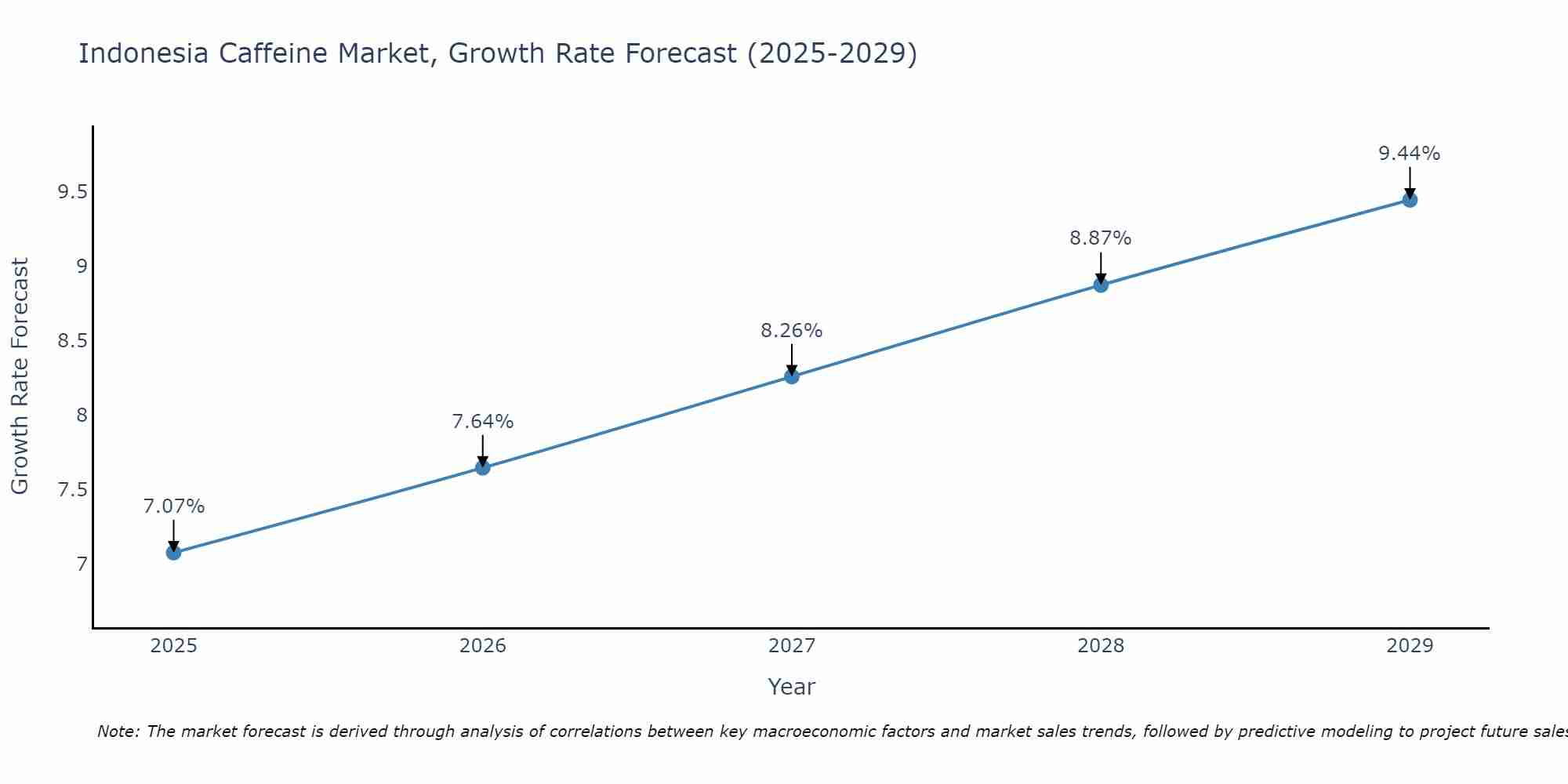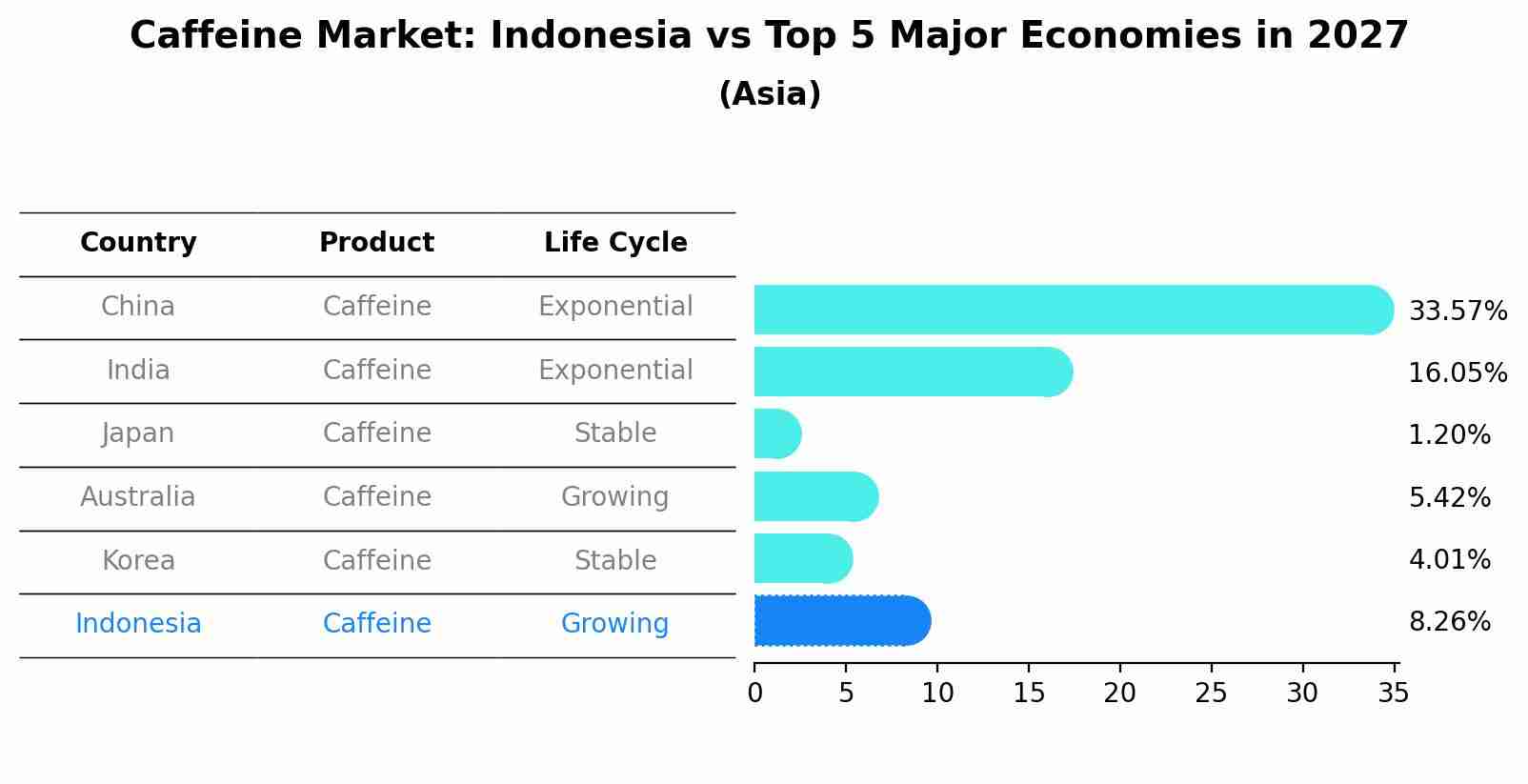Indonesia Caffeine Market (2025-2031) Outlook | Industry, Share, Value, Size, Analysis, Growth, Companies, Revenue, Forecast & Trends
| Product Code: ETC110027 | Publication Date: Jul 2023 | Updated Date: Apr 2025 | Product Type: Report | |
| Publisher: 6Wresearch | Author: Ravi Bhandari | No. of Pages: 70 | No. of Figures: 35 | No. of Tables: 5 |
Indonesia Caffeine Market Size Growth Rate
The Indonesia Caffeine Market is poised for steady growth rate improvements from 2025 to 2029. From 7.07% in 2025, the growth rate steadily ascends to 9.44% in 2029.

Caffeine Market: Indonesia vs Top 5 Major Economies in 2027 (Asia)
By 2027, the Caffeine market in Indonesia is anticipated to reach a growth rate of 8.26%, as part of an increasingly competitive Asia region, where China remains at the forefront, supported by India, Japan, Australia and South Korea, driving innovations and market adoption across sectors.

Indonesia Caffeine Market Synopsis
Indonesia is one of the world`s largest producers and consumers of caffeine, with an estimated annual market value of US$2.5 billion in 2018. It is a major supplier to countries such as Japan, South Korea, Thailand, China and India. The Indonesia coffee industry has been undergoing rapid transformation over recent years due to increased demand from both domestic and international markets. This has presented numerous opportunities for businesses looking to capitalize on this growth trend.
Market Trends
The growing popularity of specialty coffee beverages such as cold brews, nitro coffees and flavored lattes have driven up demand for high-quality caffeinated products across Indonesia urban centers. Additionally, the rise in health consciousness among younger generations has seen them opt for natural energy drinks instead of traditional carbonated drinks that contain large amounts of sugar or artificial sweeteners. As a result, there is an increase in the number of local beverage companies offering healthier alternatives such as organic tea infusions with ginger or lemongrass extracts mixed with honey or coconut milk extractions from various regions around the country.
Market Drivers
The booming economy in Indonesia is also fueling growth in the caffeine market; increasingly affluent citizens are willing to spend more money on luxuries such as speciality coffees compared to previous years when most Indonesias primarily drank instant coffee mixes sold at convenience stores and supermarkets throughout their cities or townships. Additionally, new infrastructure developments?such as gas pipelines connecting remote areas where quality Arabica beans are commonly harvested?are increasing access to these premium grades even further which could lead to higher sales figures overall since no extra transport costs need be accounted for by retailers stocking these products.
COVID-19 Impact on the Market
The outbreak of the COVID-19 pandemic has had a major impact on the Indonesia caffeine market. The spread of the virus resulted in an unprecedented lockdown, which caused businesses to temporarily close and disrupted supply chains. This created shortages of essential goods, including coffee beans, and led to higher prices for some products in the country. Furthermore, as people stayed at home more often during this period, they were forced to find alternative ways to get their daily caffeine fix - such as by purchasing ready-to-drink beverages or instant coffee mixes instead of cafe visits. Consequently, many cafes have been affected by decreased customers and sales declines due to social distancing rules implemented across Indonesia.
Challenges of the Market
One challenge facing the Indonesia caffeine market is increasing competition from local producers offering lower price points than those offered by multinational companies operating within the sector. These players are taking advantage of rising consumer demand for convenience products with fast turnaround times. Additionally, there is a need for increased investment in research and development ? such as developing new product lines that cater specifically towards local tastes - if companies wish to remain competitive within this vast market space.
Industry Key Players
Some key players currently contributing significantly towards growth within Indonesia caffeine industry include Torabika Coffee (Indofood), Nescafe (Nestle), Jacobs Douwe Egberts (JDE) , Kopiko 78Coffee Candy , Starbucks Corporation and Coca Cola Amatil. Each company offers different types of products catering towards various segments throughout Indonesia large population base ? from traditional coffees brewed using modern methods through to energy drinks containing high levels of additives targeted at younger demographics.
Key Highlights of the Report:
- Indonesia Caffeine Market Outlook
- Market Size of Indonesia Caffeine Market, 2024
- Forecast of Indonesia Caffeine Market, 2031
- Historical Data and Forecast of Indonesia Caffeine Revenues & Volume for the Period 2021-2031
- Indonesia Caffeine Market Trend Evolution
- Indonesia Caffeine Market Drivers and Challenges
- Indonesia Caffeine Price Trends
- Indonesia Caffeine Porter's Five Forces
- Indonesia Caffeine Industry Life Cycle
- Historical Data and Forecast of Indonesia Caffeine Market Revenues & Volume By Type for the Period 2021-2031
- Historical Data and Forecast of Indonesia Caffeine Market Revenues & Volume By Natural Caffeine for the Period 2021-2031
- Historical Data and Forecast of Indonesia Caffeine Market Revenues & Volume By Synthetic Caffeine for the Period 2021-2031
- Historical Data and Forecast of Indonesia Caffeine Market Revenues & Volume By Applications for the Period 2021-2031
- Historical Data and Forecast of Indonesia Caffeine Market Revenues & Volume By Pharmaceuticals for the Period 2021-2031
- Historical Data and Forecast of Indonesia Caffeine Market Revenues & Volume By Food for the Period 2021-2031
- Historical Data and Forecast of Indonesia Caffeine Market Revenues & Volume By Beverages for the Period 2021-2031
- Historical Data and Forecast of Indonesia Caffeine Market Revenues & Volume By Flavours and Fragrances for the Period 2021-2031
- Indonesia Caffeine Import Export Trade Statistics
- Market Opportunity Assessment By Type
- Market Opportunity Assessment By Applications
- Indonesia Caffeine Top Companies Market Share
- Indonesia Caffeine Competitive Benchmarking By Technical and Operational Parameters
- Indonesia Caffeine Company Profiles
- Indonesia Caffeine Key Strategic Recommendations
Frequently Asked Questions About the Market Study (FAQs):
Export potential assessment - trade Analytics for 2030
Export potential enables firms to identify high-growth global markets with greater confidence by combining advanced trade intelligence with a structured quantitative methodology. The framework analyzes emerging demand trends and country-level import patterns while integrating macroeconomic and trade datasets such as GDP and population forecasts, bilateral import–export flows, tariff structures, elasticity differentials between developed and developing economies, geographic distance, and import demand projections. Using weighted trade values from 2020–2024 as the base period to project country-to-country export potential for 2030, these inputs are operationalized through calculated drivers such as gravity model parameters, tariff impact factors, and projected GDP per-capita growth. Through an analysis of hidden potentials, demand hotspots, and market conditions that are most favorable to success, this method enables firms to focus on target countries, maximize returns, and global expansion with data, backed by accuracy.
By factoring in the projected importer demand gap that is currently unmet and could be potential opportunity, it identifies the potential for the Exporter (Country) among 190 countries, against the general trade analysis, which identifies the biggest importer or exporter.
To discover high-growth global markets and optimize your business strategy:
Click Here- Single User License$ 1,995
- Department License$ 2,400
- Site License$ 3,120
- Global License$ 3,795
Search
Thought Leadership and Analyst Meet
Our Clients
Related Reports
- India Switchgear Market Outlook (2026 - 2032) | Size, Share, Trends, Growth, Revenue, Forecast, Analysis, Value, Outlook
- Pakistan Contraceptive Implants Market (2025-2031) | Demand, Growth, Size, Share, Industry, Pricing Analysis, Competitive, Strategic Insights, Strategy, Consumer Insights, Analysis, Investment Trends, Opportunities, Revenue, Segments, Value, Segmentation, Supply, Forecast, Restraints, Outlook, Competition, Drivers, Trends, Companies, Challenges
- Sri Lanka Packaging Market (2026-2032) | Outlook, Competition, Drivers, Trends, Demand, Pricing Analysis, Competitive, Strategic Insights, Companies, Challenges, Strategy, Consumer Insights, Analysis, Investment Trends, Opportunities, Growth, Size, Share, Industry, Revenue, Segments, Value, Segmentation, Supply, Forecast, Restraints
- India Kids Watches Market (2026-2032) | Strategy, Consumer Insights, Analysis, Investment Trends, Opportunities, Growth, Size, Share, Industry, Revenue, Segments, Value, Segmentation, Supply, Forecast, Restraints, Outlook, Competition, Drivers, Trends, Demand, Pricing Analysis, Competitive, Strategic Insights, Companies, Challenges
- Saudi Arabia Core Assurance Service Market (2025-2031) | Strategy, Consumer Insights, Analysis, Investment Trends, Opportunities, Growth, Size, Share, Industry, Revenue, Segments, Value, Segmentation, Supply, Forecast, Restraints, Outlook, Competition, Drivers, Trends, Demand, Pricing Analysis, Competitive, Strategic Insights, Companies, Challenges
- Romania Uninterruptible Power Supply (UPS) Market (2026-2032) | Industry, Analysis, Revenue, Size, Forecast, Outlook, Value, Trends, Share, Growth & Companies
- Saudi Arabia Car Window Tinting Film, Paint Protection Film (PPF), and Ceramic Coating Market (2025-2031) | Strategy, Consumer Insights, Analysis, Investment Trends, Opportunities, Growth, Size, Share, Industry, Revenue, Segments, Value, Segmentation, Supply, Forecast, Restraints, Outlook, Competition, Drivers, Trends, Demand, Pricing Analysis, Competitive, Strategic Insights, Companies, Challenges
- South Africa Stationery Market (2025-2031) | Share, Size, Industry, Value, Growth, Revenue, Analysis, Trends, Segmentation & Outlook
- Afghanistan Rocking Chairs And Adirondack Chairs Market (2026-2032) | Size & Revenue, Competitive Landscape, Share, Segmentation, Industry, Value, Outlook, Analysis, Trends, Growth, Forecast, Companies
- Afghanistan Apparel Market (2026-2032) | Growth, Outlook, Industry, Segmentation, Forecast, Size, Companies, Trends, Value, Share, Analysis & Revenue
Industry Events and Analyst Meet
Whitepaper
- Middle East & Africa Commercial Security Market Click here to view more.
- Middle East & Africa Fire Safety Systems & Equipment Market Click here to view more.
- GCC Drone Market Click here to view more.
- Middle East Lighting Fixture Market Click here to view more.
- GCC Physical & Perimeter Security Market Click here to view more.
6WResearch In News
- Doha a strategic location for EV manufacturing hub: IPA Qatar
- Demand for luxury TVs surging in the GCC, says Samsung
- Empowering Growth: The Thriving Journey of Bangladesh’s Cable Industry
- Demand for luxury TVs surging in the GCC, says Samsung
- Video call with a traditional healer? Once unthinkable, it’s now common in South Africa
- Intelligent Buildings To Smooth GCC’s Path To Net Zero


















